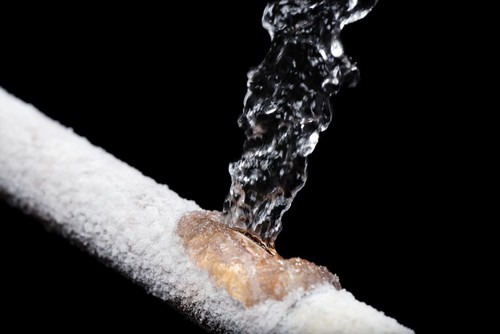Evenings are starting to get colder and before you know it, the mercury outside will be dipping below freezing. While you and your family might be comfortable and cozy inside, if you have exposed plumbing in uninsulated parts of your home, then you could find yourself dealing with frozen pipes if you don’t take precautions now.
Here are six simple tips that will help prevent your pipes from freezing this winter. Don’t take it for granted – frozen pipes can eventually burst and wind up costing you thousands of dollars in water damage.
Insulate Exposed Plumbing Pipes
Plumbing pipes that run through the basement, crawlspace, or garage are exposed to air that’s colder than what’s found throughout the rest of the home. Therefore, it’s important to wrap insulation around the pipes, so there’s a protective layer between the pipes and the cold air. This is the most important step to take when helping to prevent frozen pipes this winter.
Keep the Home at the Same Temperature Day and Night
If you are trying to keep your energy bills low, then you might be tempted to turn your thermostat down at night. While this is usually a good idea, in the deep of winter it could be a mistake because should it get too cold at night, your exposed plumbing could wind up freezing. If you plan on being away from home for a period of time this winter, set your thermostat no lower than 55 degrees.
Open Kitchen and Bathroom Cabinet Doors
If your kitchen or bathroom plumbing is on an exterior wall, then keeping the cabinet doors open will allow warm air inside where it can help prevent frozen pipes. Just be sure to remove any harmful chemicals or cleaning agents from the cabinets if you have small children or pets.
Keep the Garage Door Closed
Some homes have plumbing pipes that run through the garage. Because the garage is usually an un-heated part of the home, it is essential to keep the garage door closed to keep as much cold air out of it as possible.
Update the Insulation in Your Home
Add fresh insulation to your attic, basement, and crawl space to help keep the temperature higher in those areas. The extra insulation will also help prevent drafts that could increase the risk of your pipes freezing.
Let Cold Water Taps Drip
Before going to bed at night, turn the cold water taps on to a small trickle. By running a small amount of water through the pipes, you’ll help prevent them from freezing.
What to Do if Your Pipes Freeze
If you believe your pipes are frozen, then you need to be careful when thawing them because there’s a chance that the pipe may have already cracked. To help protect your home from flooding, you can turn off the main water feed that enters the home and look for any signs of a burst pipe.
If you don’t think your pipes have burst, then you should turn the faucet on and apply heat to the section of pipe that’s frozen. You can use an electric heating pad, a hair dryer, or a space heater to gradually increase the temperature and thaw the ice plug in the pipe.
Never use a blowtorch, propane heater, or any other heat source that uses an open flame because the high heat can damage the pipes and increase the risk of fire. Continue applying gentle heat until full water pressure is restored. If you had one pipe freeze, make sure you check all the faucets in the home because others may also be frozen.
Lastly, if you can’t find the frozen pipe or you think a pipe is broken, then contact a licensed plumber to do the job.


